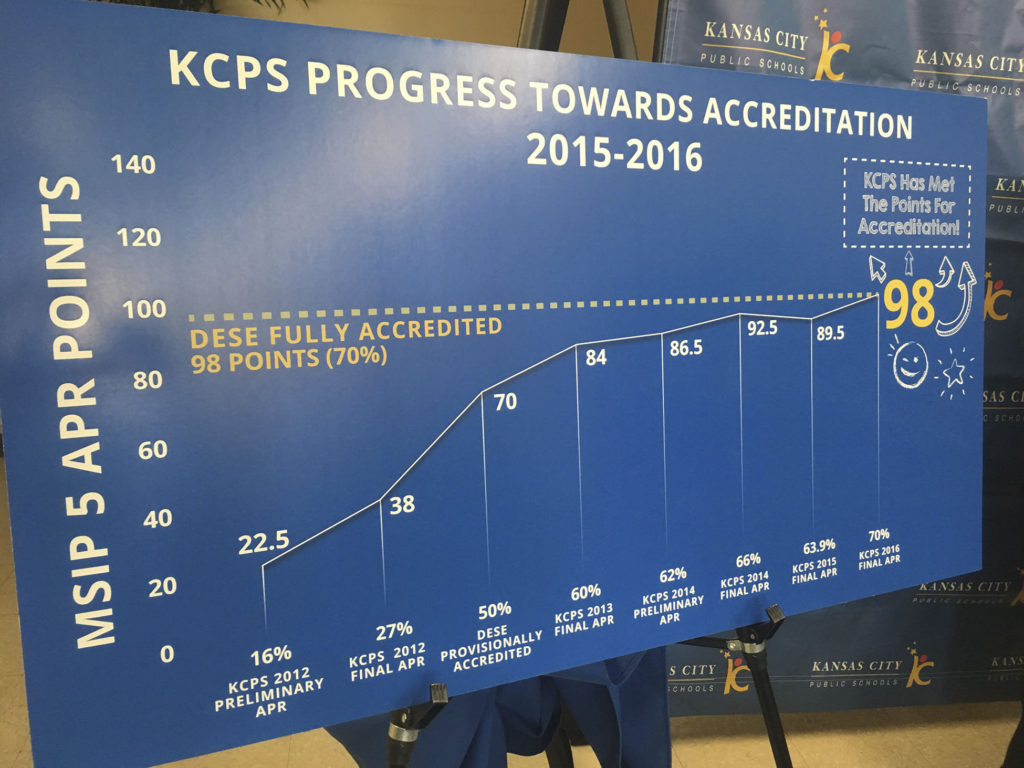
By Paul Thompson
Northeast News
November 8, 2016
KANSAS CITY, Missouri – The turnaround for Kansas City Public Schools continues.
Back in 2012, KCPS earned just 22.5 out of 140 points in its Annual Performance Report (APR), an accreditation measure released annually by Missouri’s Department of Elementary and Secondary Education (DESE). Fast forward to 2016 and the district has garnered 98 points on the 140-point scale to reach 70 percent of the possible APR points – the percentage needed for full accreditation – for the first time in decades. KCPS joins every other public school district in the state in reaching at least provisional accreditation.
“This is the first time in about 30 years that KCPS has earned the points to become a fully accredited school system,” said Superintendent Dr. Mark Bedell on Monday, November 7, to the cheers of students and staff at Wendell Phillips Elementary School. “The school system APR results have improved by more than 75 points in just four years.”
It was a day of celebration, but Superintendent Bedell and other KCPS stakeholders also realize there’s plenty of work yet to accomplish. Typically, DESE requires that a school district register two consecutive years of 70% or better APR scoring before shifting a district from provisional accreditation to full accreditation. For KCPS, that likely means another year of improved testing before earning back their full accreditation. Bedell conceded as much on Monday when discussing the district’s progress.
“You have to score at that 70% mark at least two times during an assessment cycle,” said Bedell. “In our case, we have to do one more year.”
Still, while an even bigger celebration may have to wait another year, Bedell and others were in understandably high spirits as the district announced it’s improved APR results.
“Credit goes to our students, teachers, parents, administrators, support staff, and our community partners, who have worked hard together to make these gains with integrity,” said Bedell. “This is not the end; this is a new beginning for us all.”
In total, 27 KCPS schools achieved the scores necessary for either provisional or full accreditation, including each of the district’s seven high schools. Two of the biggest movers within the district reside right here in the Northeast: Gladstone Elementary increased 25 percentage points from 2015, up to 84.3%, while Garfield Elementary has seen an increase of 37.2 percentage points (up to 77.9%) since earning only 40.7% in 2014.
For Garfield, the biggest gains in 2016 came from 4th and 5th graders in English Language Arts (ELA). The number of fourth-graders scoring proficient and advanced increased by 16.6%, while fifth graders saw an increase from 18.8% to 27.4% in the subject. In addition, the percentage of 5th grade students deemed proficient or advanced in math increased almost 20 points, from 5.3% in 2015 to 24.2% in 2016. Meanwhile, fifth grade science saw an increase from 9.3% to 18.2% in the same metric.
At Gladstone, increases in 3rd grade ELA, 6th grade ELA, and 5th and 6th grade math provided the biggest boosts to academic APR scoring. After failing to earn any points in science in 2014 or 2015, Gladstone also managed to earn 12 out of a possible 16 points in the category in 2016.
Northeast High School was another bright spot for KCPS. The school earned 24.3% of total APR points in 2014 and 44.6% in 2015, before reaching 61.4% of APR points in 2016. At Northeast, end of course (EOC) testing showed that in ELA, the percentage of students scoring proficient or advanced increased from 31% to 50.9% this year. Meanwhile, math scores increased from 19.8% scoring proficient or advanced to 23% doing so. In science, 20% of students scored proficient or advanced, up from 15.5% doing so last year. With science scores largely seeing decreases statewide, Northeast High School’s improved performance in that area was a particular point of pride for KCPS.
“To give you an idea, Lincoln Prep actually decreased by about 5-6%. Central went up a fraction of a percent. Unfortunately, Paseo Academy decreased significantly in that area. East also decreased in that area from 32.8% to 22.8%,” said Ray Weikal, KCPS Manager of Public Relations and Marketing.
“Clearly, seeing those kinds of gains is heartening, and I think it demonstrates what’s possible with the right kind of focus,” Weikal added. “It’s very exciting that more than half of our students at Northeast High School are now considered proficient and advanced in English Language Arts.”
In his remarks at Wendell Phillips Elementary, Bedell addressed the key ways he expects KCPS to continue building on the positive gains seen over the past several years. He discussed the need to develop trauma-sensitive schools that can address the social and emotional needs of students, in addition to academic needs; spoke about the district’s 1:1 student to electronic device ratio, and how KCPS can best utilize that technology; and strongly emphasized the district’s mentoring program, which is designed to ensure that all students have adult role models they can rely on outside of their family.
“My goal as the superintendent is to do something bold, to see that 7,500 to 8,000 of our kids are touched by some type of positive adult advocate over the next five years,” said Bedell.
While these changes are being implemented, Bedell remains realistic about the state of the district. He emphasized that KCPS has the highest English Language Learners (ELL) population in the state of Missouri, and that the district’s 41% mobility rate remains a significant impediment to achieving the continued academic gains expected by DESE. Additionally, Bedell noted that more than 400 students have recently re-entered KCPS after previously spending time at charter schools.
“We had 87 newcomers enroll into our school district last month. Some of these kids cannot speak English at all, and they’re dealing with trauma,” said Bedell. “As a school system, it really does put us at a disadvantage because we have multiple languages that are being spoken. We know that our resources only go so far.”
















